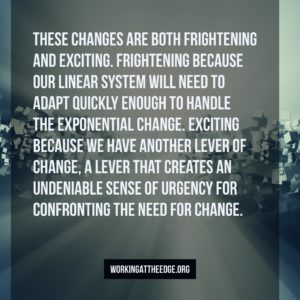 As we think about transformation of the education system, it’s important that we scan the current landscape but also “patrol the border between now and next” to best understand the changes that will ultimately disrupt our world as we know it, including the way we educate and learn. While I’ve previously written (and even put a few podcast episodes together) about this idea, I wanted to share a new resource I’ve discovered along with questions that can help shape our thinking about transformation.
As we think about transformation of the education system, it’s important that we scan the current landscape but also “patrol the border between now and next” to best understand the changes that will ultimately disrupt our world as we know it, including the way we educate and learn. While I’ve previously written (and even put a few podcast episodes together) about this idea, I wanted to share a new resource I’ve discovered along with questions that can help shape our thinking about transformation.
TED Radio Hour: The Digital Industrial Revolution
In this episode of what is always an excellent podcast, we learn from four TED speakers about the signals we ought to be thinking about as we transform our educational system. Thinking strategically about the future of life can be translated into actions that agents of transformation leverage to shift the system to better prepare learners.
Erik Brynjolfsson: In A Race With Machines, Can We Keep Up?
Exponential change starts small but soon becomes overwhelming. These exponential changes will impact all sectors of the economy since they are all tied in some way to technology. We shouldn’t be thinking about jobs, we should be thinking about tasks. Which tasks are better for humans? Which tasks are better for robots/AI? Brynjolfsson shares we have been doing this for ages. Thinking this way has been what has made us more valuable and more productive.
We use the phrase “college and career ready” frequently. If the economy is about to be disrupted, is our current paradigm of “career” even valid? How have we reshaped our thinking about college and career planning? How might we focus on tasks rather than careers?
The future is about computers and humans working along side each other. Brynjolfsson states, “Racing with the machine beats racing against the machine.” This match of man and machine will eliminate most routine and drudgery.
How do we create more experiences for learners to leverage the power of technology to eliminate the routine and drudgery of learning and provide opportunities for the exercise of uniquely human skills such as creativity?
Marco Annunziata: What Will Human-Machine Collaboration Mean For Our Jobs?
“We are at the beginning of a massive historical transition which will lead to a new economic system, a new industrial system, a new way of life which will be really qualitatively different from what we are experiencing now. The impact is going to be enormous.”
What is the plausible horizon for this change? 15-20 years, but we will begin to see substantial change in the next 5 years. We are seeing these signals of change already as products become more affordable, and new demands for new jobs with different skills emerge. Innovation is disruptive, but it is also representative of growth.
For this “new economic system,” will people need specific content knowledge or new skills? Is our current content-based, school-directed curriculum adequate, or will the new system require levels of agility that we currently don’t expect of learners? What will the role of agency be in the new economy? Will people need to take more ownership of how they pivot from problem to problem, job to job, even career to career? Is agency more important now than ever?
Maurice Conti: Can Machines Think And Feel For Themselves?
Human/robot collaboration is for the better of both the human and the robot. Each has their own strengths: the computer – brute force computation on tons and tons of data; the human – the ability to lead the robot and think in ways computer are not yet capable of.
In what ways are our learners collaborating with robots or computers – leveraging their unique qualities? How can educators use these examples as models to create further opportunities to enhance an understanding of this inevitable relationship?
Jeremy Howard: Will Artificial Intelligence Be The Last Human Invention?
Deep learning is the replacing of human intelligence with artificial intelligence. Deep learning is growing at an exponential rate and visible in examples such as Skype translation and IBM Watson’s work diagnosing disease. With deep learning, computers are trained to think, interpreting massive amounts of data in ways that are humanly impossible. Deep learning is growing exponentially.
What are the opportunities and threats of deep learning, especially in the sphere of education? What skills will be taken over by the technology and which will continue to be left to humans? How does our education system currently reflect the development of these skills and where are the gaps?
The changes outlined in the podcast are both frightening and exciting. Frightening because our linear system will need to adapt quickly enough to handle the exponential change, and we don’t have a good track record of adapting quickly. Exciting because we have another lever of change, a lever that creates an undeniable sense of urgency for confronting the need for change.
How can you leverage future trends to transform your education context?
Connect with Randy on Twitter, the TLTalkRadio podcast, and the Shift Your Paradigm podcast!
Get new content delivered to your inbox and the ebook 3 Key Principles of Digital Transformation. The ebook contains valuable information from my experience leading a digital transformation and working with a variety of stakeholders over the past decade.
- A silver lining - January 22, 2022
- Is our use of tech working against us? 🤔 - September 8, 2021
- What’s NOT going to change in the next 10 years? 🤔 - September 7, 2021